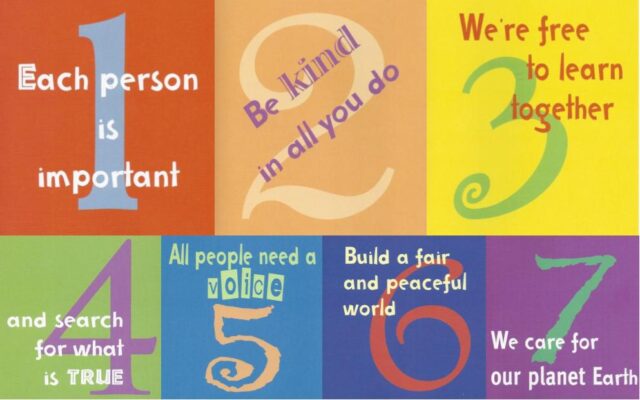“Unitarian Universalist” is a really long name.
What is now known as Unitarian Universalism came into being in 1961 when two previously independent but friendly denominations, the American Unitarian Association and the Universalist Church of America, merged to become the Unitarian Universalist Association.

Unitarianism in the United States became a distinct movement in the early part of the nineteenth century as a rejection of the rigidly dogmatic Calvinism which was then dominant. The Unitarians, led by such notables as William Ellery Channing, challenged the logic and plausibility of some of the key Calvinist doctrines, insisting on the full humanity of Jesus and the loving-kindness of God.
Universalism had an earlier origin, being founded in the late eighteenth century, and having as its core principle the belief that no loving God would consign anyone to eternal torment but that salvation was universally available. Early Unitarians and Universalists understood themselves as part of the Christian church, though other dogmatic Christians condemned and ostracized them.
From the beginning of both traditions, the primacy of individual conscience in matters of faith has been a central tenet. This lack of doctrinal conformity has led to the welcoming of other types of thought. In the late nineteenth century, the scientific insights of Darwin were incorporated rather than resisted (not entirely surprising, as Darwin himself was a Unitarian). In the early twentieth century, Unitarian ministers were among the first signatories of the Humanist Manifesto. The theological insistence on the worth and dignity of all persons has placed Unitarian Universalists at the forefront of feminism, the struggle for LGBTQI+ equality, anti-racism and anti-imperialism.
Our UU Principles: principles to live by
In 1984, after several years of deliberative consultation, the Unitarian Universalist Association adopted its statement of Seven Principles. Member congregations of the UUA covenant (promise each other) to affirm and promote:

- The inherent worth and dignity of every person;
- Justice, equity and compassion in human relations;
- Acceptance of one another and encouragement to spiritual growth in our congregations;
- A free and responsible search for truth and meaning;
- The right of conscience and the use of the democratic process within our congregations and in society at large;
- The goal of world community with peace, liberty, and justice for all;
- Respect for the interdependent web of all existence of which we are a part.
An 8th Principle has been proposed and has already adopted by a growing number of individual congregations: “Journeying toward spiritual wholeness by working to build a diverse multicultural Beloved Community by our actions that accountably dismantle racism and other oppressions in our ourselves and our institutions.”
Our Sources of Wisdom. Well, some of them, anyway.
We live out the Unitarian Universalist Principles within a “living tradition” of wisdom and spirituality, drawn from sources as diverse as science, poetry, scripture, and personal experience. These are the six primary sources our living tradition has named, though it is not an exhaustive list:

- Direct experience of that transcending mystery and wonder, affirmed in all cultures, which moves us to a renewal of the spirit and an openness to the forces which create and uphold life;
- Words and deeds of prophetic women and men which challenge us to confront powers and structures of evil with justice, compassion, and the transforming power of love;
- Wisdom from the world’s religions which inspires us in our ethical and spiritual life;
- Jewish and Christian teachings which call us to respond to God’s love by loving our neighbors as ourselves;
- Humanist teachings which counsel us to heed the guidance of reason and the results of science, and warn us against idolatries of the mind and spirit;
- Spiritual teachings of Earth-centered traditions which celebrate the sacred circle of life and instruct us to live in harmony with the rhythms of nature.